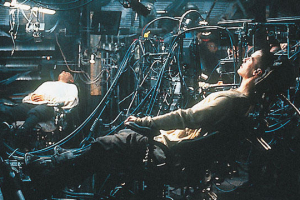Most people's first encounter with The Matrix took place during the 1999 Super Bowl, when Warner Brothers invested in a million-dollar trailer to be shown during the commercials. The ad showed some incredible special effects mixed with martial arts, with the iconic shot of Neo (Keanu Reeves) dodging bullets while Morpheus said in voiceover: "Unfortunately, no one can be told what the Matrix is. You have to see it for yourself."
When summer of 1999 came, people did see it for themselves, and it was the science fiction film that people wanted to see rather than the Star Wars: The Phantom Menace film that movie-goers were given at that same time. It was a film that struck a chord with movie audiences at the time, and its science fiction premise is one that is similar to science fact with our coming age of Virtual Reality.
The Matrix marketing team was smart when it didn't tell what it was about, which made seeing the film a new experience. Unlike today's modern blockbusters, it wasn't tied to a comic book or young adult book franchise. When I attempted to describe The Matrix to a co-worker, I asked if he had heard of virtual reality. When he replied an unsure "yes", I then asked him to imagine a world where virtual reality is so good that you wouldn't be able to tell the difference between VR and actual reality.
In the film, Neo discovers that the world he lives in is not real, but he and every other human being on the planet has been placed within some kind of suspended animation with an advanced VR simulator. All human beings are unknowingly trapped in this vast program called The Matrix. The purpose of the Matrix is to have human beings feel like they are actually living a waking life, so their inherent energy that they produce is used to power the mechanical beings that really run the world.
The actual world of The Matrix is nothing more than a burned-out planet that is the product of human/robot wars. It is discussed in the film that The Matrix began when human beings had finally developed a form of Artificial Intelligence that allowed races of intelligent robots to be created to empower humans to do their daily tasks. Sadly, the robots turned on us, and then decided humans are better off powering the robots.
To even entertain that we are close to the world or situation of The Matrix involves a lot of leaps of imagination, not to mention logic. We simply don't have machines that have achieved levels of sentience like that, but we are making advancements in Virtual Reality daily. This year, the Oculus Rift, HTC Vive, and PlayStation VR are just some of the headsets that will be available to the general public, for a price that could keep them out of the hands of the typical consumer.
As someone who has tried them out, I can say that they do make you feel that you are in a virtual world. The artificial ones still feel very artificial, and any one that isn't artificial is just a result of 360 degree video. At this rate, it would take at least years, if not generations, before we have the kind of simulation programs equal to that shown on The Matrix.
The issue is as Virtual Reality becomes more popular, there will be demands to have a more realistic experience. When that happens, people will become more switched off when they go online. It will be a world more like Ernest Cline's Ready Player One, a book that is being adapted into a film directed by Steven Spielberg. In that novel, people mostly lived and worked online, but they also lived in the real world.
The Matrix is a film that could still be very prophetic. In the early nineties, there was a push to make Virtual Reality an actual reality. This was probably the inspiration for the Wachowski siblings in writing The Matrix, and is actually a worst-case scenario for a society that embraces VR to its fullest. The issue is that the film warns people what happens when we embrace this mentality, which should keep the wise out of the Matrix, provided you have a greater respect for the quality of reality than fantasy.
However, there is a recent development from IBM Japan to develop a Sword Art Online game that can be played on a VR headset. If you haven't heard of this anime series, it has a similar premise of people stuck in a fantasy world due to a virtual reality program gone rogue. And we are developing a VR game based on this source material? Perhaps we haven't learned from The Matrix after all.

















